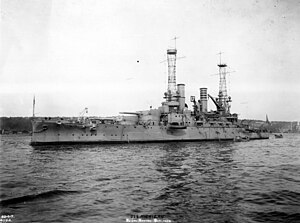 USS Michigan (BB-27) in 1912
| |
| History | |
|---|---|
| Name | Michigan |
| Namesake | Michigan |
| Builder | New York Shipbuilding Corporation |
| Laid down | 17 December 1906 |
| Launched | 26 May 1908 |
| Commissioned | 4 January 1910 |
| Decommissioned | 11 February 1922 |
| Stricken | 10 November 1923 |
| Fate | Sold for scrap |
| General characteristics | |
| Class and type | South Carolina-class battleship |
| Displacement | |
| Length | |
| Beam | 80 ft 3 in (24 m) |
| Draft | 24 ft 6 in (7 m) |
| Installed power |
|
| Propulsion |
|
| Speed | 18.5 kn (21 mph; 34 km/h) |
| Range | 6,950 nmi (7,998 mi; 12,871 km) at 10 kn (12 mph; 19 km/h) |
| Complement | 869 |
| Armament |
|
| Armor | |
USS Michigan (BB-27), a South Carolina-class battleship, was the second ship of the United States Navy to be named in honor of the 26th state. She was the second member of her class, the first dreadnought battleships built for the US Navy. She was laid down in December 1906, launched in May 1908, and commissioned into the fleet 4 January 1910. Michigan and South Carolina were armed with a main battery of eight 12-inch (305 mm) guns in superfiring twin gun turrets; they were the first dreadnoughts to feature this arrangement.
Michigan spent her career in the Atlantic Fleet. She frequently cruised the east coast of the United States and the Caribbean Sea, and in April 1914 took part in the United States occupation of Veracruz during the Mexican Civil War. After the United States entered World War I in April 1917, Michigan was employed as a convoy escort and training ship for the rapidly expanding wartime navy. In January 1918, her forward cage mast collapsed in heavy seas, killing six men. In 1919, she ferried soldiers back from Europe. The ship conducted training cruises in 1920 and 1921, but her career was cut short by the Washington Naval Treaty signed in February 1922, which mandated the disposal of Michigan and South Carolina. Michigan was decommissioned in February 1923 and broken up for scrap the following year.